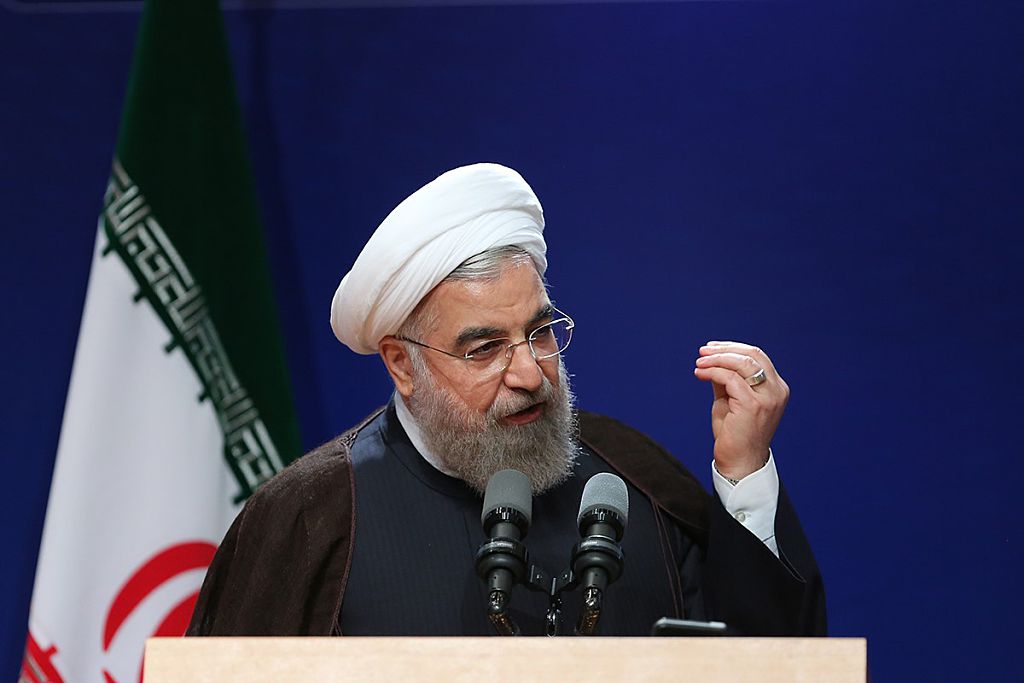
The Iran nuclear deal has emerged as a point of contention in the U.S. presidential election, with Republican candidate Donald Trump saying the deal has been “disastrous” for the U.S., even as Democratic candidate Hillary Clinton has vowed to uphold it. But the deal is controversial in Iran as well. One day after Iran’s Supreme Leader Ayatollah Ali Khamenei harshly criticized the nuclear deal signed last year between Iran and six world powers for not having any meaningful effect on the livelihood of Iranians, the Islamic Republic’s President, Hassan Rouhani, has praised the deal for lifting the threat of war and giving Iran an open hand in the sale of crude oil.
“The most important effect of the JCPOA [the Joint Comprehensive Plan of Action] is that the threat of war was lifted,” Rouhani said in a live interview on State TV on Tuesday. “Our enemies had put Iran’s case under chapter 7 of the UN Charter, at any moment our country could have been embroiled in an unwanted war. Before the nuclear deal super powers were standing over us and preventing us from selling more than a million barrels of oil per day, but now we can sell as much as we want and this is a point of honor.”
Read More: Neighboring Iran Warily Watches Turkey’s Attempted Coup
Rouhani has been criticized in Iran over the deal, but he responded today by citing the benefits the agreement had brought the Islamic Republic. “If the deal had not happened we wouldn’t be able to export oil, access to our assets would have become harder by the day, and the sanctions on the automobile sector, petrochemicals, money transfer and precious metals would have caused very dire circumstances for the country.”
While agreeing with Khamenei’s claims that the United States has failed to fully upkeep its side of the nuclear deal—Khamenei has demanded that sanctions should be lifted immediately, rather than gradually as they are now—Rouhani seemed to hint that some brinkmanship was at play in the criticism leveled at the Western powers involved in the deal. “When we face our foreign counterparts we must speak in one way, we must bring up their faults, shortcomings and negligence, but when we speak to the people we must also tell them of the other side of the story. The fact is the nuclear deal has created a good situation in the country.”
Read More: A Retired Canadian Professor is Among Three Dual Nationals Facing Charges in Iran
Ayatollah Khamenei had strongly criticized the United States for what he calls its duplicity and treachery regarding their commitments in the nuclear deal on Monday, and had cautioned officials of the Islamic Republic that any further negotiations with the U.S. regarding other regional issues between the two countries would be dangerous for Iran. “I said last year that these nuclear talks will be test for us, to see how the Americans will behave, well now we know. They give promises to our face but conspire and prevent any progress in action. This experience showed that we cannot speak to them on any issue as trustable counterparts.”
Political analysts close to the government had repeatedly said that agreeing to a nuclear deal could lead to further negotiations, and eventually make cooperation between Iran and the United States possible on other matters of joint interest—an argument President Obama himself has made. But Ayatollah Khamenei firmly shut the door on this possible opening between the two, saying “Some ask me what’s the problem with negotiating [with the U.S.], well the problem is that they will get concessions from you but will break their promises in action…This is why I have for years been saying that we will not negotiate with the Americans, this shows that the problems we have with them in the region, in different issues, cannot be solved with negotiations.”
Rouhani, a moderate who is up for reelection in less than a year and has touted the nuclear deal and direct interaction with world superpowers including the U.S. as the main achievement of his presidency, sounded dismayed on the bleak outlook on widening the scope of talks with the U.S. “If the Americans had acted with good intentions in the nuclear deal we might have trusted them and held negotiations on other issues with them, but unfortunately they didn’t do well in this test.”
More Must-Reads From TIME
- The 100 Most Influential People of 2024
- The Revolution of Yulia Navalnaya
- 6 Compliments That Land Every Time
- What's the Deal With the Bitcoin Halving?
- If You're Dating Right Now , You're Brave: Column
- The AI That Could Heal a Divided Internet
- Fallout Is a Brilliant Model for the Future of Video Game Adaptations
- Want Weekly Recs on What to Watch, Read, and More? Sign Up for Worth Your Time
Contact us at letters@time.com